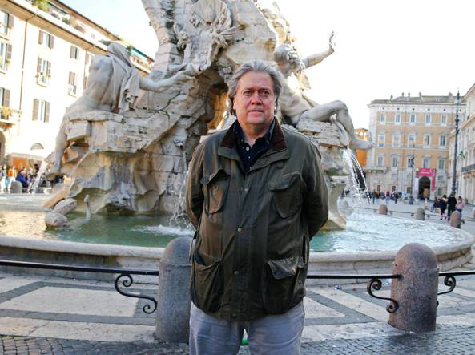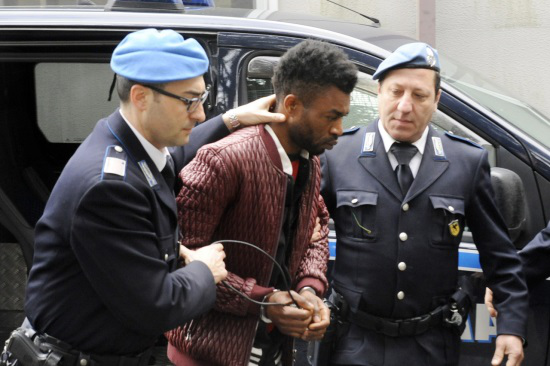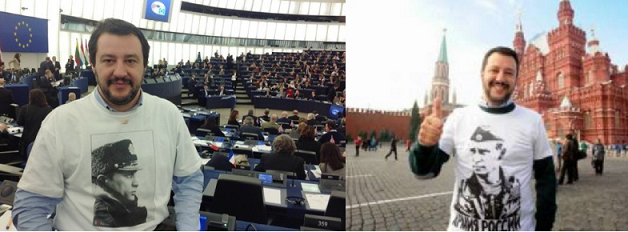Political globalization – “an agreement among different nations to create a system of government that regulates the international political and economic relationships, distributing powers between central authority and Member States.” (World Federalist Manifesto, Guide to Political Globalization, 2007).
Some few years ago, it seemed that there was no alternative to political globalization, at least, in Europe. The European Union has united Western and Central Europe and used processes like centralization, standardization and unification as effective means to deprive European nations of their sovereignty.
And who is in the fringe group now?
That caused natural resistance from anti-globalists, but over the last quarter of a century, the “European integrators” have done their best to push them to the outskirts of politics. And now they regard them as “anti-system men,” “radicals,” “neo-Nazis,” “Eurosceptics,” “populists” and so on, in one word, “political outcasts”: just remember, Austria of 1999, where during parliamentary elections, the EU’s opponents (the Freedom Party of Austria) polled 27% of the votes and formed a ruling coalition with the People’s Party. That turned Austria into an outcast: 14 EU members cut their cooperation with the Austrians, while Israel (and in Europe it is sometimes more than Europe!) even recalled its ambassador from Vienna.
But the “anti-system men” are not born yesterday: after Donald Trump’s surprising victory in the United States (and his slogans were mostly against globalization), they regained their foothold in Europe and in late 2017, even won seats in the Austrian Cabinet: deputy chancellor, foreign minister, interior minister and defense minister.
In Germany, things are even more serious. The Eurosceptical Alternative for Germany (AfD) have not gained seats in the German Cabinet but have become the biggest opposition force in the Bundestag and will now chair the Budget Committee. Without that committee’s approval, the German Federal Government will not get a single euro cent from the budget. It is the duty of the Budget Committee to decide how much the federal government should spent and on what.*
*(On Jan 31, 2018, AfD member Peter Boehringer was appointed as Chairman of the Budget Committee).
The March elections in Italy turned a new page for the European anti-globalization movement. Three out of the ten winning parties (eight parties within a coalition and two independent parties) - 5-Star Movement (M5S, with “Participate, Choose, Change” slogan), the League (Lega, Italians First) and the Brothers of Italy (Fratelli d’Italia, the vote that unites Italy) – openly oppose the EU and globalization and have polled a total of 54.38% of the votes. As a result, they will get 386 seats in the parliament.
Even more, Lega has become the leader of the center-right coalition and theoretically can get the 104 votes of the right-wing Forza Italia.
And what about the Eurooptimists? + Europa (with More Europe, Italy needs it slogan) and Insieme (Together is better) have together polled 3.15%and will not have seats in the Italian parliament.
So, you can see that the European anti-globalists know how to win! Now it is the European integrators who have found themselves in the outskirts of politics, at least, in Italy, a country that gave Europe the world’s first globalization project – the Roman Empire.
It is not so important to win as to preserve the victory.
This may become a problem for the Italian anti-globalists. Their leaders perfectly know the theory: “I think that the terms ‘rights’ and ‘lefts’ are used up. The last elections in the United States, France and many other states have shown that the fight is not between the rightists and the leftists but between those pushing globalization and those defending sovereignty.” (Matteo Salvini, the leader of Lega).
But in practice both Salvini and the leader of M5S Luigi di Maio seek the office of prime minister. So, we may well witness a fight between two anti-globalist forces and this may well end in a loss for all of them.
In this light, we would like to quote Steve Bannon, the ideologist of Donald Trump’s election campaign and one of the founders of the nationalist populist movement in the United States.
Bannon is currently working on a kind of a populist Internationale. He visited Italy during the elections so as to watch and to learn before going to Zurich for delivering a report on the global implications of populism.
In an interview to Corriere della Sera, Bannon expressed confidence that Lega and M5S will form a coalition and that coalition will be a big threat for the EU. In the end, he added that even if this does not happen, it does not mean that this will not happen in future.

And that future is not only Hungary, Montenegro, Latvia or Luxembourg (all of them are to conduct elections in 2018), but also Belgium (in 2019). If Eurosceptics win in a country that hosts the EU’s headquarters, it will be a knockdown for the union. In his interview, Bannon said that he is looking for sponsors for his populist Internationale and is going to create an information network for disseminating the ideology of economic nationalism. He also mentioned the Catholic Church and expressed doubt that it has done enough for stopping the global persecutions of Christians. He said that the Pope is impeccable in his teachings but not in politics.
The B – I – R marker
The Italian elections have exposed Europe’s sore spots: Brussels – Immigration – Russia – three trumps that can help the anti-globalists to win.
B - Brussels, or a matter of 20 billion
Salvini and di Maio do not oppose the EU. Salvini has given up on his idea to organize an exit referendum, while di Maio said during his visit to the United States that the EU is a national home for Italy. But both believe that unfair EU agreements are affecting Italian companies and that Italy is contributing too much into the EU’s budget – 20bn EUR.
But in reality, Italy pays to the EU 4.5bn EUR a year, which is just 0.28% of its GDP. This is not a big loss for the Italian economy, but this is a very nice figure for an election campaign. What the Italian anti-globalists want is not to get their money back but to transform the EU’s bureaucratic centralized empire into a common market of sovereign states.
I – Immigration, or the Macerata attack
The Italian laws prohibit holding public opinion polls within two weeks before an election. The results of the last poll held by Termometro Politico before the parliamentary elections in Italy had little in common with the results of the elections: the ruling Democratic Party polled 2.58% fewer votes than it was expected according to the poll, while Lega and M5S polled 2.57% and 6.36% more than expected.
But let’s not hurry to accuse Termometro Politico of bias. Before the elections, Italy experienced a shock the local press later called a “Macerata Attack”: the dismembered body of an 18-year-old woman was found on Jan 31. The body was in two suitcases dumped in the countryside outside Pollenza near Macerata in Marche. Young Nigerian immigrant and Innocent Oseghale was held on suspicion of the murder. The killed woman was drug user Pamela Mastropietro. Oseghale was a drug dealer.

A lone Italian gunman wounded six African immigrants four days later. Police identified the suspect as Luca Traini, a 28-year-old Italian, who had run as a candidate for the anti-migrant Northern League party in a local election last year in the city of Corridonia. He did not win. When caught he said that it was a kind of vendetta. Traini has a fascist-inspired tattoo and left a Mussolini votive candle near the spot where Mastopietro's body was found. Pamela's mother later thanked the man for being one of the few who actually avenged her daughter.

The Italians also took Traini’s side. On Feb 20, Sunday Express suggested that the incident might become decisive for the outcome of the upcoming elections. And it was right. The winners were Lega and M5S, who have always been against immigrants in Italy. “I'm sick of seeing immigrants in hotels and Italians who sleep in cars,” Salvini said at a rally before the elections.

Immigrants are one of the biggest sore spots for the European integrators and each similar incident is giving advantage to their anti-globalist opponents.
R – Russia, or losses are unacceptable
The European integrators are the key authors of the anti-Russian sanctions, while the attitudes of the much more rational Lega and M5S are very close to those of Russia. Just like Russia, they object to the EU’s habit to infringe on nations’ sovereignties.
In 2016, Lega’s senator Sergio Divina said that the Italian businessmen were fed up seeing Italy losing lots of money because of the anti-Russian sanctions. He specified that since the EU imposed sanctions against Russia, Italy has lost 3.6bn-4bn EUR.
So, no surprise that Salvini, who believes that the EU’s economic reforms have thrown Italy 30 years back, wore a T-shirt with Putin’s picture both in the European Parliament and on the Red Square in Moscow.

The B – I – R marker will be dominant in all election campaigns in Europe in near future. But this may affect Russia too as the country’s foreign political and defense industry achievements may soon be neutralized by declining consumption or social stagnation. If this happens, it will be Russia’s turn to ask, “What to do with Russia?”
Andrey Ganzha (Kiev), specially for EADaily
 Without heat and light: About a hundred shells arrived at Kherson CHP — OVA
Without heat and light: About a hundred shells arrived at Kherson CHP — OVA The railway station in Fastov near Kiev was destroyed to the ground — RBC-Ukraine
The railway station in Fastov near Kiev was destroyed to the ground — RBC-Ukraine Baza: Russian couple deported from Thailand after a fight with a Belgian and his escort
Baza: Russian couple deported from Thailand after a fight with a Belgian and his escort Expert: The European Union has spent frozen Russian assets, there is nothing to confiscate
Expert: The European Union has spent frozen Russian assets, there is nothing to confiscate The German parliament rejected resolutions on Russian assets and nuclear deals
The German parliament rejected resolutions on Russian assets and nuclear deals The city is approaching the front line: The Russian army poses a threat to Kramatorsk
The city is approaching the front line: The Russian army poses a threat to Kramatorsk